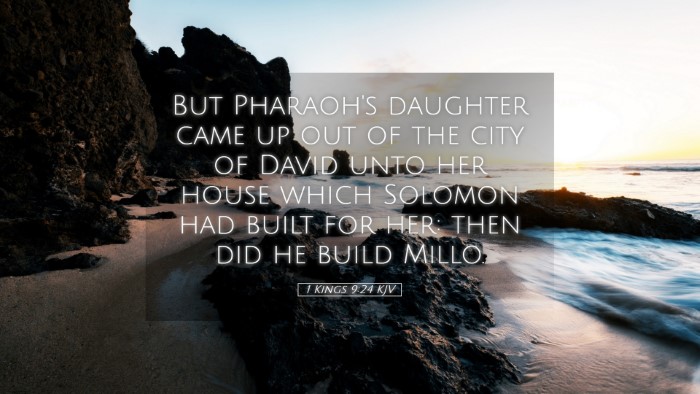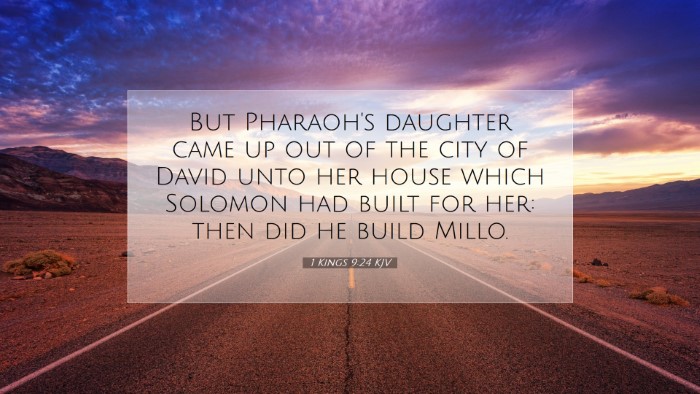Commentary on 1 Kings 9:24
Verse Context: 1 Kings 9:24 states: "But Pharaoh's daughter came up out of the city of David unto her house which Solomon had built for her: then did he build Millo." This verse is situated within the narrative of Solomon's reign over Israel, detailing the architectural accomplishments and the diplomatic marriages that strengthened his kingdom.
Exegesis of 1 Kings 9:24
Pharaoh's Daughter: The mention of Pharaoh's daughter illustrates the political alliances Solomon secured through marriage. Such unions were common in ancient Near Eastern politics and served to fortify Solomon's rule by creating bonds with powerful neighboring nations.
The City of David: This phrase refers to the original site of Jerusalem and is significant in its historical and theological implications. It represents not only the heart of Davidic legacy but also the beginning point of Solomon's extensive building projects.
Insights from Commentators
Matthew Henry’s Commentary
Matthew Henry emphasizes the importance of this marriage alliance, noting that it was typical for kings to forge relationships through such unions. He remarks that Solomon's building of a special palace for Pharaoh's daughter indicates acknowledgement and respect for the foreign royal family, thus reinforcing the political alliance.
Henry also highlights that Solomon's architectural endeavors, including the building of Millo, reflect his ambition and capability. Millo may have served both a defensive and administrative purpose, showcasing Solomon's strategic foresight in urban planning.
Albert Barnes’ Commentary
Albert Barnes notes that the phrase "came up out of the city of David" suggests a geographical and perhaps metaphorical elevation, aligning with her status as a royal figure. He points out that Pharaoh's daughter likely came from a place of splendor, observing the contrast with the more rugged, formative years of Jerusalem under David.
Barnes asserts the significance of Millo as a fortification project. It symbolizes the consolidation of Solomon’s power and the protection of his realm against potential adversaries, indicating that Solomon's reign was not just about cultural and economic prosperity but also about safeguarding Israel’s future.
Adam Clarke’s Commentary
Adam Clarke gives insight into the construction of Millo, suggesting that it may have served a dual purpose: not merely a place of residence but also a defensive enhancement. Clarke highlights the strategic location of Millo, relating it to the overall civil enhancements initiated by Solomon to stabilize and beautify Jerusalem.
Furthermore, Clarke raises a critical observation regarding the implications of marrying foreign women. He suggests that while such alliances could lead to greater diplomatic relations, they also posed risks of idolatry and the adopting of practices contrary to Israelite worship, a theme that transcends the narrative and resonates throughout the history of Israel.
Theological Themes
- Royalty and Politics: The union between Solomon and Pharaoh’s daughter not only signifies personal boundaries but also explores divine destiny and human agency in establishing a kingdom.
- Urban Development: The construction projects initiated under Solomon are testimonies to God's blessings and favor on His king, mirroring a divine mandate for order and beauty within His people.
- Danger of Compromise: The introduction of foreign influences represents potential vulnerabilities; it sets the stage for future deviations from covenant faithfulness, which reverberates through the subsequent narratives of Israel's history.
Application for Pastors and Theologians
This verse calls for reflection on the balance of political alliances and spiritual integrity within church leadership. Modern congregational leaders must navigate relationships and partnerships without compromising kingdom values.
Likewise, the concepts of urban development and community engagement can speak to the church's role in society. Just as Solomon's actions were meant to enhance societal structure, churches today are called to contribute positively to their communities, reflecting God's intent for order and flourishing.
Moreover, the warnings found in this passage serve as a profound reminder for theological educators and leaders. Maintaining doctrinal purity amidst cultural integrations is a persistent theme in spiritual leadership that remains relevant in contemporary contexts.


